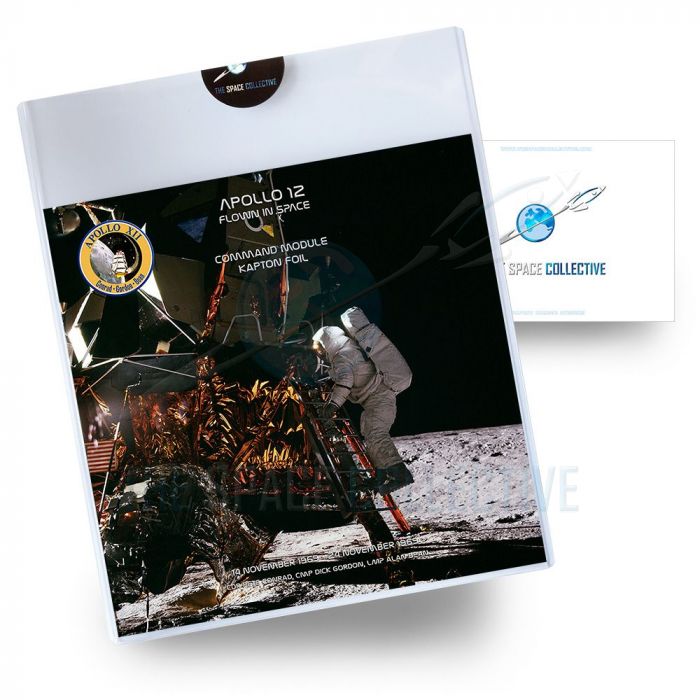

Apollo 12 Flown CM Kapton Foil Artifact #2
A genuine segment of Apollo 12 flown kapton foil from the Apollo 12 Command Module "Yankee Clipper" and comes attached to a mission photograph of Lunar Module Pilot Alan Bean descending the LM to the lunar surface.
Out of stock
DESCRIPTION
This artifact presentation contains a genuine piece of Apollo 12 flown Command Module "Yankee Clipper" kapton foil. The pressure-sensitive polyimide tape insulation, most commonly referred to as kapton foil, was part of the spacecraft thermal protection subsystem. The purpose of the kapton foil was to protect the crew and electronic systems from the solar radiation experienced in deep space. During reentry into Earth's atmosphere, much of this foil was burned away with the remains being stripped during post-flight operations and restoration.
Product Information:
- Segment of genuine Apollo 12 Command Module kapton foil
- Attached to an 8" x 8" Apollo 12 mission photograph of Alan Bean descending to the lunar surface
- Printed on original glossy Fuji Crystal Archive Supreme® paper (226µ, 238 gr/m²)
- Includes certificate of authenticity with holographic logo and company stamp
- Comes sealed in a clear protective 8" x 10" toploader
Authentication Information:
The space flown material came from the collection of MSC Lunar Receiving Lab photographic technician Terry Slezak. Slezak was famously known for being quarantined along with the Apollo 11 crew after coming into contact with moon dust while removing the plastic seal from Magazine "S", one of the 70mm magazines taken during Apollo 11 EVA. The exterior of the cassette displayed traces of a black powdery substance, this being traced back to a moment during the mission where Neil Armstrong reported that he had retrieved a 70mm cassette which had dropped to the Lunar surface.
Lifetime Guarantee of Authenticity:
All of our artifacts are thoroughly and extensively researched before being listed for sale, so much so that we're proud to offer a lifetime guarantee of authenticity for this and other artifacts listed throughout our website. We also hold a record of every piece we sell which can be identified and searched in our online database using the serial number listed on your certificate of authenticity.
Description
This artifact presentation contains a genuine piece of Apollo 12 flown Command Module "Yankee Clipper" kapton foil. The pressure-sensitive polyimide tape insulation, most commonly referred to as kapton foil, was part of the spacecraft thermal protection subsystem. The purpose of the kapton foil was to protect the crew and electronic systems from the solar radiation experienced in deep space. During reentry into Earth's atmosphere, much of this foil was burned away with the remains being stripped during post-flight operations and restoration.
Product Information:
- Segment of genuine Apollo 12 Command Module kapton foil
- Attached to an 8" x 8" Apollo 12 mission photograph of Alan Bean descending to the lunar surface
- Printed on original glossy Fuji Crystal Archive Supreme® paper (226µ, 238 gr/m²)
- Includes certificate of authenticity with holographic logo and company stamp
- Comes sealed in a clear protective 8" x 10" toploader
Authentication Information:
The space flown material came from the collection of MSC Lunar Receiving Lab photographic technician Terry Slezak. Slezak was famously known for being quarantined along with the Apollo 11 crew after coming into contact with moon dust while removing the plastic seal from Magazine "S", one of the 70mm magazines taken during Apollo 11 EVA. The exterior of the cassette displayed traces of a black powdery substance, this being traced back to a moment during the mission where Neil Armstrong reported that he had retrieved a 70mm cassette which had dropped to the Lunar surface.
Lifetime Guarantee of Authenticity:
All of our artifacts are thoroughly and extensively researched before being listed for sale, so much so that we're proud to offer a lifetime guarantee of authenticity for this and other artifacts listed throughout our website. We also hold a record of every piece we sell which can be identified and searched in our online database using the serial number listed on your certificate of authenticity.
